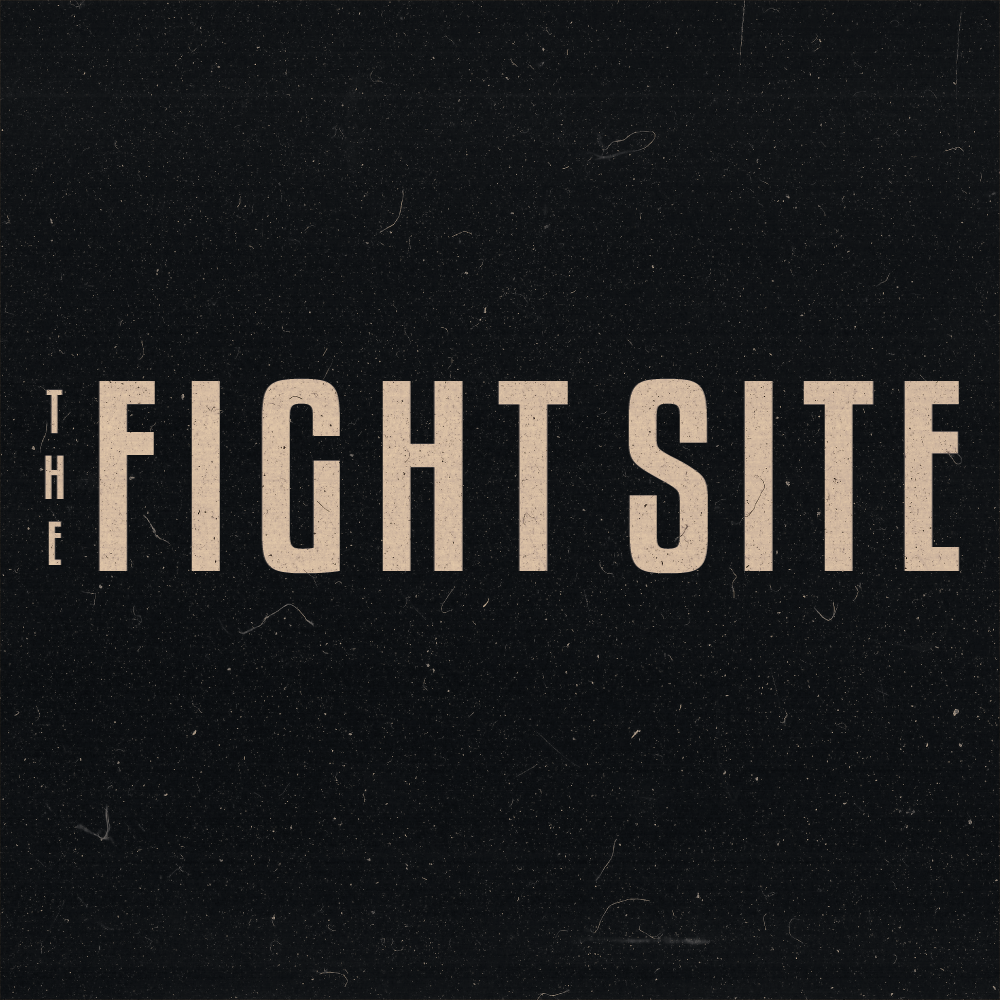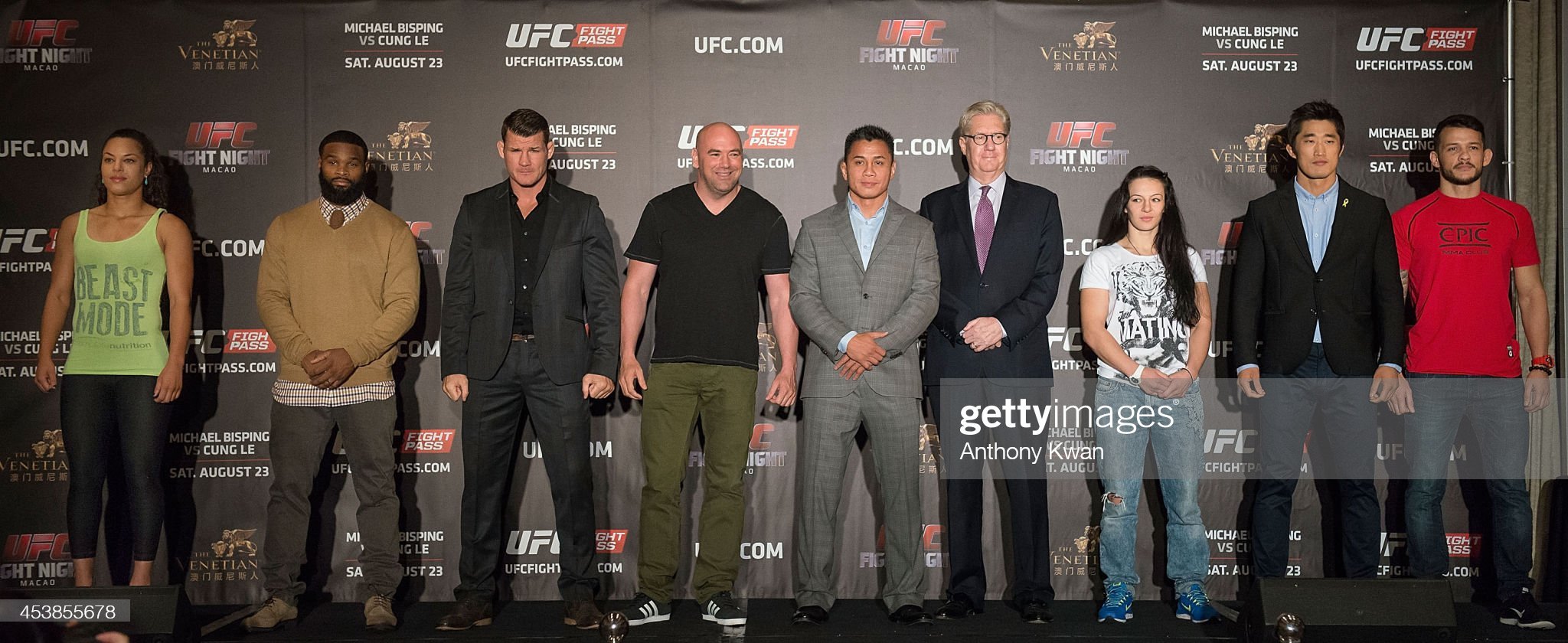Why the UFC Antitrust Lawsuit is Good for Fans
HONG KONG - AUGUST 20: Elizabeth Phillips, Tyron Woodley, Michael Bisping, Dana White, Cung Le, Edward Tracy, Milana Dudieva, Dong Hyun Kim, Alberto Mina at the Macao UFC Fight Night Press Conference at the Four Season Hotel on August 20, 2014 in Hong Kong. (Photo by Anthony Kwan/Getty Images)
MMA fans deserve nothing. This is seen best in their reaction to the UFC Antitrust Lawsuit. Instead of being shocked by how unfair the contracts UFC fighters have, they cry about not getting all the “perfect” matchups the UFC can put on by bullying their fighters. The concerns from MMA fans arose from the Ali Act, a boxing reform that broke down the Mafia’s stranglehold on boxing and gave more negotiating power to boxers.
Because of this power, boxers could negotiate their terms without interference from promoters. Often this led to breakdowns in communications for high-level fights where the “A-side” of the bought wasn’t clear. MMA fans worry that if the UFC has to play fair with fighters, we won’t see all the high-level matchups when they are relevant. This means that fans lose out if the UFC’s monopsony is broken by the antitrust lawsuit.
However, it is this writer’s firm, and objectively correct opinion, that MMA fans have a lot more to gain from a successful antitrust lawsuit than what they have to lose. Also, the argument that the UFC having a stranglehold on fighters is good for fans has a single, particularly meaningful mistake.
The UFC Antitrust Lawsuit means Better Fights
People who are passionate about fighter interests often complain about the poor state of revenue share between fighters and the UFC. On average, UFC fighters get about 18% of all the revenue made by the UFC year-over-year. Compared to other pro sports like the NFL, whose players get about 48% of revenue, there is a huge pay gap. You might want to ask, how do fighters getting more money benefit fans?
Well, a lot of high-level fighters can’t afford to train full-time, a recent example is Alexandre Pantoja (26-5), the UFC Flyweight Champion, who, while waiting between fights during the Covid-19 lockdowns, had to work for 6 months as an uber eats driver. Dominick Reyes (12-4) used to work as an IT Technician, Al Aiquinta (14-7-1) is famous for being a real estate agent, and Geoff Neal (15-5) worked as a waiter during fight camps.
While not all of these fighters had 9-to-5’s out of necessity, it is telling that all of these ranked, elite fighters, were not training full time. If this is the case for the top 15 of a division, then what does this mean about fighters who haven’t reached the pinnacle of the sport?
I don’t think it’s a controversial statement that if fighters could train better, they would perform better, and who benefits from better performances from fighters? MMA fans.
Mo’ Money Mo’ Talent
Recently, multiple boxing title holder Terrence Crawford appeared on the Joe Rogan Experience, where Rogan asked if Crawford would ever compete in MMA. Crawford said the money wouldn’t be worth his while. While MMA fans might be confused as to why a boxer not fighting in MMA is a loss for them, it’s worth noting that Crawford comes from Nebraska, where you get your wrestling shoes the day you learn to walk.
But a 35-year-old Crawford is not the only loss of potential MMA talent. If MMA fighters could make more money in general, then a lot of high-level athletes would be interested in pursuing the sport. Right now the only high-level athletes who pursue MMA are wrestlers and kickboxers, because the money in MMA, however pitiful, is still better than what they get in their sport.
But imagine if MMA could attract all the elite talent around the world. Imagine divisions filled with Yoel Romeros, Chad Mendeses, and John Dodsons. Think of how many cool fighters and fights we could enjoy if the UFC just spent a bit more on the product.
Don’t you think that would be within the fans’ best interests?
The UFC Antitrust Lawsuit Could Mean Superfights!
Remember when we got Johnson vs. Horiguchi 2? Or Fedor vs. Lesnar? Or any other cool matchup that could’ve happened between MMA organizations? Well, if fighters can test free agency without being thrown to the lions, then we’re way more likely to get some once-in-a-lifetime super fights between the elite MMA organizations. If we can get awesome fights then I think that’s something MMA fans can see as a benefit of the UFC Antitrust Lawsuit.
The UFC is Bad at Arranging Fights
The crux of the argument that MMA fans will miss out if the UFC Antitrust Lawsuit goes through is that big fights won’t get made because the fighters will have actual agency over their careers. Now I am not denying that fact, it’s quite likely it will happen. A lot of the biggest fights in MMA got through because the UFC bullied their talent. But let’s not pretend the UFC is great at booking fights fans want to watch.
I am going to list a few fights that have been booked by the UFC, are of a high level, and will likely be boring, or at least do nothing to serve the fan's interest.
Jones vs. Miocic: Jones finally making the move to heavyweight and the UFC tries and bank on this by feeding him a guy who cannot wrestle in Cyriil Gane, and a man who has not fought in three years in Miocic. This is an insult to the fans and to Jones’ legacy to be honest.
Edwards vs. Covington: Covington is not a particularly compelling draw. Nor does he have a single win over an active top 15 fighters right now. Covington is also old, chinny, and not exactly a compelling matchup for Edwards.
Adesanya vs. Strickland: I mean do I have to say anything about this fight? It’s a complete joke, whose best-case scenario is a layup for Adesanya, and whose worst-case scenario is a boring layup for Adesanya.
Let's not forget the bizarre matchmaking decisions in recent years, like completely wrecking the bantamweight division by giving Dominick Cruz, TJ Dillashaw, and Henry Cejudo unnecessary and undeserved title shots. The UFC is bad at the one thing they are supposed to do, so fans not getting the fights they want is not a new thing, nor will that change if the antitrust lawsuit goes through.

